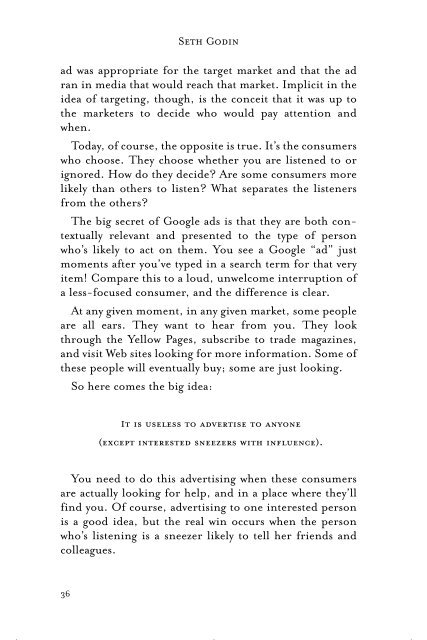uiscZ
uiscZ
uiscZ
Create successful ePaper yourself
Turn your PDF publications into a flip-book with our unique Google optimized e-Paper software.
Seth Godin<br />
ad was appropriate for the target market and that the ad<br />
ran in media that would reach that market. Implicit in the<br />
idea of targeting, though, is the conceit that it was up to<br />
the marketers to decide who would pay attention and<br />
when.<br />
Today, of course, the opposite is true. It’s the consumers<br />
who choose. They choose whether you are listened to or<br />
ignored. How do they decide Are some consumers more<br />
likely than others to listen What separates the listeners<br />
from the others<br />
The big secret of Google ads is that they are both contextually<br />
relevant and presented to the type of person<br />
who’s likely to act on them. You see a Google “ad” just<br />
moments after you’ve typed in a search term for that very<br />
item! Compare this to a loud, unwelcome interruption of<br />
a less-focused consumer, and the difference is clear.<br />
At any given moment, in any given market, some people<br />
are all ears. They want to hear from you. They look<br />
through the Yellow Pages, subscribe to trade magazines,<br />
and visit Web sites looking for more information. Some of<br />
these people will eventually buy; some are just looking.<br />
So here comes the big idea:<br />
It is useless to advertise to anyone<br />
(except interested sneezers with influence).<br />
You need to do this advertising when these consumers<br />
are actually looking for help, and in a place where they’ll<br />
find you. Of course, advertising to one interested person<br />
is a good idea, but the real win occurs when the person<br />
who’s listening is a sneezer likely to tell her friends and<br />
colleagues.<br />
36


